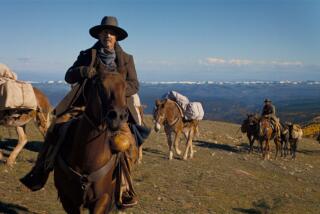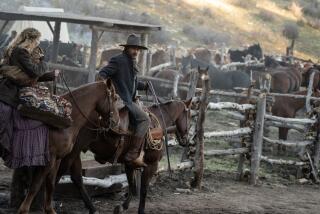Kevin Costner bets on himself again in ‘Swing Vote’
KEVIN COSTNER’S “ Swing Vote” tells the story of an apathetic man floating through life, happy to play whatever cards life deals him. Costner’s approach to making the film couldn’t have been more different: Rather than watch the Capra-esque fable about a deadlocked election drift away, the actor stepped up to invest more than $21 million of his own money to finance it.
A-list actors are increasingly willing to defer their multimillion-dollar salaries to help get difficult movies made, usually taking a bigger cut of the film’s profits in exchange. George Clooney slashed his fee for “Michael Clayton,” Sean Penn worked below his normal rate for the upcoming “Milk” and Julia Roberts hardly got rich costarring in the new independent movie “Fireflies in the Garden.”
There’s only a handful of top stars, though, who are willing to go beyond a salary deferral and actually place their own money at risk. Mel Gibson famously pulled $25 million out of his bank account to fund 2004’s “The Passion of the Christ,” and Al Pacino spent some of his money to produce 1996’s “Looking for Richard.”
Costner has one of the longest -- and best -- track records for putting his money where his movie is. Including 1990’s Oscar-winning “Dances With Wolves,” 2003’s “Open Range” and Friday’s “Swing Vote,” the 53-year-old actor-director has proved remarkably adept at betting on himself, even though Costner says it’s not that much of a gamble.
A popular courtroom maxim holds that a defendant who represents himself has a fool for a client. But as Costner’s experience proves, the creative and financial rewards of backing yourself in Hollywood can be lucrative.
“I’m not a fool,” says Costner, who both stars in and produced “Swing Vote” with longtime partner Jim Wilson. “I do my own math, and I know at the end of the day what’s at risk. I don’t call it a roll of the dice. I call it a calculated risk.”
In “Dances With Wolves,” which Costner directed and produced with Wilson, Costner put $2.5 million of his $3-million salary into the film when the production went over budget. The epic western not only won the best picture Oscar but also grossed $424 million worldwide.
Costner invested $750,000 of his own funds in the development of “Open Range,” which he also directed and co-produced, and took no money upfront in exchange for a share of the film’s profits. The western grossed nearly $60 million domestically and, when all ancillary revenue was counted, delivered about $30 million in profits to Costner’s company, Tig Productions, Costner says.
As financially rewarding as some of these deals may be, Costner says the real motivation is getting movies he believes in (and that audiences may like) to theaters. Because so many studio film deals are contingent on foreign distribution agreements and income projections of everything down to licensing revenue, ideas often take a back seat to profit-and-loss spreadsheets.
“When I’m making a movie,” Costner says, “I don’t want to have to worry about how the pre-sales are going. I want to make the movie.”
“Swing Vote,” written by Jason Richman and Joshua Michael Stern and directed by Stern, was a classic case of a movie caught for years in Hollywood’s slowly grinding machinery. “It had been around, and some companies had tried to make it, but interest had waned,” Costner says.
Costner says he was struck by the film’s conceit: a working-class slacker in a small New Mexico border town who, thanks to a voting machine glitch, will single-handedly decide a presidential election.
Because Bud Johnson (Costner) isn’t really focused on anything besides his next beer, his 12-year-old daughter, Molly (Madeline Carroll), must motivate and educate her indifferent dad. At the same time, the incumbent Republican ( Kelsey Grammer) and the Democratic challenger ( Dennis Hopper) try to win Johnson’s vote, often by abandoning positions they once held dear. “Are you a participant or are you an observer? That’s what I liked in the story,” Costner says.
It’s a political movie that doesn’t really take sides, though, which may make “Swing Vote” especially appealing these days. Unlike Oliver Stone’s upcoming “W.,” “Swing Vote” is not didactic -- it’s populist -- and that may help attract moviegoers in the nation’s heartland.
Costner decided to star in the film and looked for a backer for “Swing Vote’s” tentative $20-million budget. But the model some financiers wanted to use -- by raising capital through foreign pre-sales -- didn’t strike him as equitable.
“They want to raise it on your name, but you’re not actually benefiting from that,” Costner says. “So I looked to my wife and said, ‘Why don’t we just do this?’ And she said, ‘OK.’ ”
When the film went slightly over budget, Costner kicked in an additional $1.3 million. But then Disney bought the film’s domestic distribution rights, and with other territories sold off, Costner says he’s now about $1 million in the black.
The movie will have a tough time making much of an impact this weekend, as it must fend off the “Dark Knight” juggernaut and the opening weekend of “ The Mummy: Tomb of the Dragon Emperor,” which is on track to gross more than $50 million in its premiere weekend.
“I don’t make art that I can put on my refrigerator,” Costner says. “I want to make good movies that could potentially be a hit.
“But we’re going to do great,” he says. “I own this movie for the rest of its life. And that’s like owning beachfront property.”
More to Read
The biggest entertainment stories
Get our big stories about Hollywood, film, television, music, arts, culture and more right in your inbox as soon as they publish.
You may occasionally receive promotional content from the Los Angeles Times.











